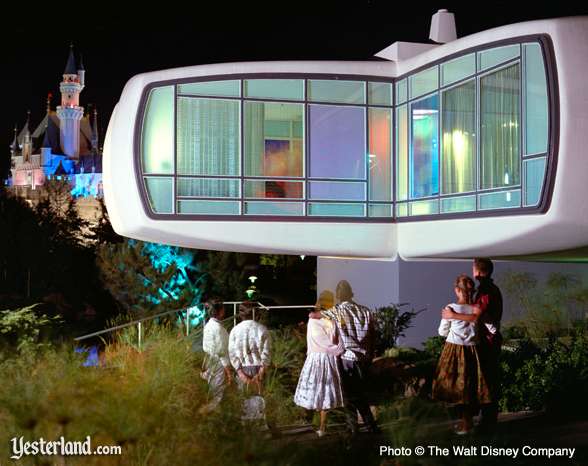 When I was a kid one of my favorite parts of Disney World was Tomorrowland’s Carousel of Progress. It was steeped in 1950’s futurism: Why, of course! Every family will have their own electric paint mixer in the future! And I only wish I’d been old enough to see this gem before it was torn down and replaced with a souvenir stand: The Monsanto House of the Future, a house built entirely of plastic.
When I was a kid one of my favorite parts of Disney World was Tomorrowland’s Carousel of Progress. It was steeped in 1950’s futurism: Why, of course! Every family will have their own electric paint mixer in the future! And I only wish I’d been old enough to see this gem before it was torn down and replaced with a souvenir stand: The Monsanto House of the Future, a house built entirely of plastic.
Disney likes to talk up inventions the house featured that wound up becoming commonplace, like the microwave oven. What it leaves out are all the ones that never did. You know, the type of things we saw on the Jetsons: flying cars, our food in pill form, robot butlers and maids. Sadly, as it turns out the “future” looked a lot like the past, just more streamlined. Had Tomorrowland stayed in tact, it would have looked more like the Tomorrow-that-never-happened-land.
I’ve been thinking about Tomorrowland for about three days. It started when I read Farhad Manjoo’s excellent piece on Slate about the “Jurassic Web.” He painted a picture of what the Web was like in 1996. It was mostly a place you went and then thought, “OK, I’m here. Now what?” He reminded us of the sheer wonder the first time you could search on Amazon by author or browse through Yahoo’s hand built “directory” of Web pages.
The note Manjoo struck at the end of the piece was pure Silicon Valley: If all this happened in just 13 years, what will the next decade of the Internet hold? Will we look back on YouTube, Facebook, Hulu and iTunes as primitive?
This is where Tomorrowland and the Jetsons come in. There seems to be a pattern of diminishing innovation the longer a new technology is on the market. The early years—even decades— of, say, the plane, the car, the telephone, television, computers all saw rapid innovation, such rapid innovation that people would look back with the same kind of wonder that we do thinking of the Jurassic Web. “Can you believe you used to have to crank a car engine?” “What do you mean TV was only in black and white?”
But at some point, the innovation gets more evolutionary than revolutionary. Sure there are advancements in digital filmmaking and editing equipment but has anything in movies yet transformed the medium as much as the change from silent pictures to talkies? At some point, the technology stays the same while the cultural importance of it, or the way it is used is what changes. Put another way, the technology that was used to film a movie like “Deep Throat” wasn’t what changed society and the industry, it was the content of the movie itself.
I know it’s heresy to write this on a site that entrepreneurs and technologists read: But what if the bulk of technology innovation on the Internet is, well, done?
Already, if you think about Web 2.0, the successful companies are building off the technology that was pioneered before—whether it’s the browser, broadband, or the open source stack. Sites like YouTube and Twitter may be technically hard to scale, but are they really technical leaps in innovation, or more of a creative, cultural leap in how existing technology is being used?
Of course, the Internet is still very young. It certainly took technologies like the mobile phone more than 13 years to go from that embarrassing brick that took up half of a briefcase to the iPhone. Some could argue the mobile phone is still ripe for as much game changing innovation, as new models like the Palm Pre promise to integrate the browser experience throughout the user interface. Is it simply too early in the Internet’s lifecycle to even raise the question of whether Internet innovation has peaked?
As someone who writes about the Web for a living, I certainly hope so. But then again, everything has happened faster on the Web. No other technology has been so rapidly adopted by such a large number of people. Is it possible this is it?